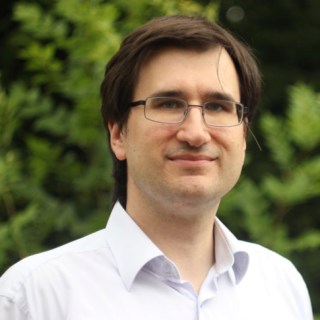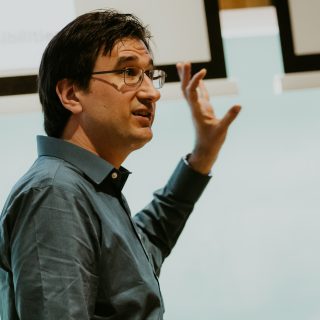He has Hungarian origins, he grew up in Saudi Arabia but a piece of his heart stayed in Budapest forever. He cured a crocodile and put screws in a camel’s mandible before giving up clinical practice. We interviewed Dr Mark Hedberg, who talked about how he ended up in biotechnology and why you mustn’t be scared of change.
Mark graduated from UVMB as a veterinarian in 2006. The University had less than 50 foreign students per academic year back then. This number has grown nearly four times as much since then. Although students have much more technological options today, their higher numbers perhaps make it more difficult to keep them together than in our time, he recalled his college years.
What happened to you after you got your degree?
After graduation, I started working in a small animal clinic in Saudi Arabia, where I used to work as a volunteer during my college years. As an intern, I scrubbed the cages a lot, I jumped when the vets needed anything, like an extra hand to hold a grumpy cat. This experience came handy at the university when the teacher of a surgical or obstetric practice asked me to hand over instruments that I already knew. So eventually I was trusted to stay by his side, hand him the tools and see everything from the first row. I’ve always been inquisitive, I still love to learn or discover new things to this day.
 What was it like to work as a vet in the Middle East?
What was it like to work as a vet in the Middle East?
It wasn’t like an adventure each day but I did have my fair share of interesting cases. For example, one day a man walked in with a phone in his hand (because the high and mighty, like sheiks, never come in personally, they send in their chauffeurs or a servant instead), which I had to take and then they asked me how much I knew about crocodiles. I loved the courses with exotic animals back at the university but I hadn’t seen a live crocodile there. However, the case was a good example of vet solidarity because I could immediately call my former teacher who gave me the information I needed. So everything went on the right track. Some time later I had to put screws in an 800-kilo camel’s mandible which was broken at two places. We had to knock him out which he wasn’t quite keen on, so we had to argue with him a lot but we solved the problem eventually.
You left Saudi Arabia for England where you quit clinical practice. What was the reason?
I worked in another small animal clinic in England for the first two years but then I went to a veterinary assistant training college where I began working in training and conference organization. My family was the primary reason for my decision. After working overtime, night shifts and weekend duty for five years, I wanted to spend more time home with my family. However, I stayed in contact with veterinary science: as a training programme organizer, I had to keep my knowledge up-to-date. I went to a lot of conferences where I kept an eye out for the people who were the best in their own field as well as for those who could be the best teachers. Then I returned to practice; I established a small animal clinic that I managed for two years. It was quite a big challenge, too.
After that, I transferred to a biotechnology company. My current job is basically sales but my veterinary background is very useful. I visit universities and pharmaceutical companies a lot. I assess what equipment they need for research and experiments. As a vet I know more than just how the particular equipment works: I know the whys and the physiological background as well.
Don’t you sometimes miss animal care?
Regardless of how hard it was, I loved working as a clinical vet. Everything has a good and a bad side, too. I’m not saying I gave up clinical practice forever but if I can feel good here, I’ll stay. But then again, who knows what I will be doing in five years? Interviewers like to ask everyone this question but I was never able to predict it, honestly. One thing is certain: as long as a vet uses his knowledge and experience, he’s still a vet.
My situation is perhaps different in the sense that I was a teenager when I decided I wanted to be a vet. Many people are already sure about that at the age of four, and they can’t even imagine wanting to do something else. When I was four, I still wanted to be a pilot or a firefighter, just like so many other kids. Since I made the decision later in life, the change was perhaps easier for me. It was still hard but I was able to take this step. It’s not an easy job to be a vet. You can fall in love with it but they will call you at the weekend or in the middle of the night, you’ll have to face screaming clients, so it’s not easy all the time.
In your opinion, what kinds of opportunities are there for new graduates?
I’m not saying that it’s harder or easier for graduates today. I’d rather say it’s different. I think I was lucky to have found a job right after I left the university. I know some people who had to search a lot. With Facebook, WhatsApp, Viber and other platforms, international communication is much easier today. Of course, we also had Facebook and Twitter “back in those days” but it’s much easier to be international and collect information today. There are some countries with many vets and some others where there’s a shortage of them. For example, there are few of them in England now because many foreign vets went home due to the Brexit.
Knowing what you know now, what advice would you give to your student self?
That’s an interesting question. In retrospect, I realized how important the basics of pharmacology were. Of course, everybody can learn the available drugs in their third, fourth or fifth-year studies but the exciting part is the practice, that’s what we all look forward to. When I was in the Middle East I had to realize that the medications I knew were not available there, so I had to focus on the possible substitutes and what older drugs may perhaps be used. In retrospect, I would have benefited from knowing all this back at college.
Based on your own example, what do you think graduating vets should know?
I often say you’d be hard-pressed to identify an arc or pattern in my career. There’s no such thing there even though I did have an idea originally. I always took the next step because it brought something new; it meant some kind of advancement compared to the previous one. I had some good and some not so good decisions but I learnt from each of them. Of course, I was worried at times, I’m not a superhero but you mustn’t be scared of change. (Naturally, you can be afraid, fear is a human thing.)
 What opportunities do you think vets have if they don’t want to go into clinical practice?
What opportunities do you think vets have if they don’t want to go into clinical practice?
In such cases, most people target a career as a clinical consultant. Pharmaceutical companies always employ a vet to supervise research studies and to act as a coordinator in terms of drug reaction reports. There are few positions like that, it’s not easy to get there. The second most popular choice is the med rep job, perhaps. It’s not bad for a beginning. Although salaries are not quite outstanding, you can gain very useful contacts. Many doctors are reluctant to spend time with them but if you think about it, med reps are the ones who always know which practice will be vacant, where you can expect changes or an expansion, which company is going to buy which, etc. If you already have some experience like that, you can stand out from the other applicants. Clinical or not, it’s never easy to get your first job.
I hope our students can learn a lot from your example. How do you remember your college years?
I remember when I worked for “Kivetítés” (”Projection” in English, the predecessor of Univet Magazine). Finishing the magazine around 2 a.m., 10 minutes to deadline – I have lots of nice memories of that. I was also a senator in the Student Council: I served two terms and I learnt a lot about the internal operation of the University at the time. But I loved the friendships, the relationships the most. I’m fascinated how much more foreign students the University has today than in my time. We were a smaller community back then. I still keep in touch with lots of alumni and many of them come back to Budapest regularly. We say that if you’ve lived in Budapest for a few years, you’ve left a corner of your heart here.
